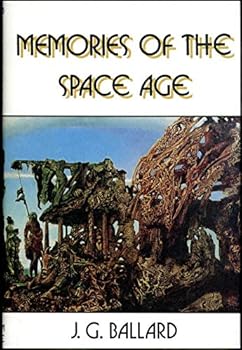Memories of the Space Age
Select Format
Select Condition 
Book Overview
No Synopsis Available.
Format:Paperback
Language:English
ISBN:0870541579
ISBN13:9780870541575
Release Date:January 1988
Publisher:Arkham House Publishers
Length:216 Pages
Weight:0.85 lbs.
Customer Reviews
3 ratings
The History of the Future
Published by Thriftbooks.com User , 20 years ago
In 1968, the day after the Apollo moon landing, PanAm, one of the USA's biggest airlines at the time, began accepting reservations for flights to the moon. NASA, some time later, announced plans for a permanent moon base by the 1980s. It is difficult for someone who was not much more than a twinkle in someone's eye at the time, to imagine the mood of optimism that surrounded the landings and the extent to which it entered the psyche and fired the imagination. Ballard's collection of short stories presented in "Memories of the Space Age" were written between 1962 and 1985, spanning the moon landings and shuttle flight and are largely a reaction to that optimistic mood. The reader is placed in a recogniseable future and shown back over the desolate terrain of the space race. The grand and rotting folly of the Cape Canaveral launching towers populate many of the stories yet it is often seen from a distance - from the long-shadowed, evening enclosures of equally rotting tourist hotels. Hotels that might once have served as layovers for space tourists. Ballard's memories are the future memories of 1960s consumerism which manifested in aerodynamically designed fridges and toasters. He is fascinated with the way science shapes itself in the popular mind. We are like the cargo cult in the story "A Question of Re-Entry" who stumble across a re-entry capsule. We are the cargo cult of tourism, the consumption of destination, the consumption of science. Ballard questions these apropriations of science in the service of tourism/consumerism but it is with a dream logic that is no logic at all. 'Where are we going and what for?' We are like the character Melville from "My Dream of Flying to Wake Island". He dreams of the journey and the pull is strong, but he doesn't know why or even exactly where it is. He shuns offers of journeys to other exotic locales as he works at freeing his aircraft (creating the means) to go there. In the end we leave him as he watches the wind cover his aircraft once again with sand. The antidote to this is Scranton, the ex-astronaut in "The Man Who Walked on the Moon", the penultimate story. When asked what it was like to *be* on the moon he replies that it was "just like being here." In what way does time and space really shape our existence? Ballard is in fine form, his seemingly languid prose delivers compact descriptions and dream-like action to form an open narrative that requires and rewards interrogation. Likewise, the accompanying illustrations by Jefferey Potter are complex and multi-layered. The images both set a scene and challenge it by their surreal detail and juxtaposition of such incongruous elements as the space shuttle with a Sopwith Camel. I have offered one of many possible readings of this book which is truly dense with meaning. I mentioned that the space age optimism that Ballard comments on is distant history to my generation, however, we do live in an age when a similar optimism pervad
End of "The Dream"
Published by Thriftbooks.com User , 21 years ago
I read the book several years ago in its Arkham House first ed. It floored me and has stayed with me ever since. These stories are amazing work. The idea, from one of the Canaveral stories, of people taking pieces of dead astronauts and making them into objects of religious veneration was astounding, and seemingly incredible until pieces of Columbia began to show up on eBay. This is simply one of the finest collections of sociological SF ever written--period. Ballard is proactive and prophetic here; I've read this collection again and again, and it's probably most haunting for those of us born during the Camelot era. We watched as Apollo 11 touched down and then we dreamed of space tourism to the moon and Mars bases by 2000. Now, as The Dream (with a capital D) of space travel limps along like a blind, poor beggar attacked by feral dogs, I keep returning to Ballard's collection. Read it, as my students will do this year, and weep for a lost dream.
Memories of the Sun
Published by Thriftbooks.com User , 24 years ago
I could hardly agree more with the previous review, except to give this fine book five stars. Ballard's stories are not so much literary inventions as they are dreams of worlds that exist in some yet undiscovered realm, which Ballard has been generous enough to describe for us. His bright, at times incandescent, use of metaphor and surreal imagery contrasts wonderfully with a cool, detached and beautifully fluid prose style. Readers of these stories may not appreciate what they find, but they WILL recognize that they have been someplace very different.





